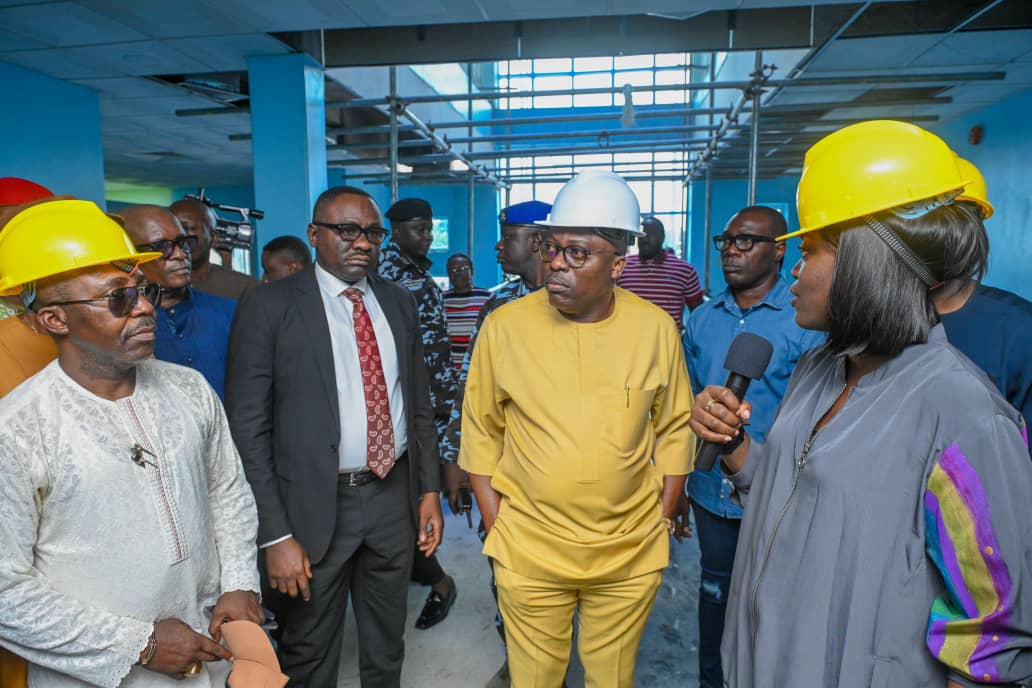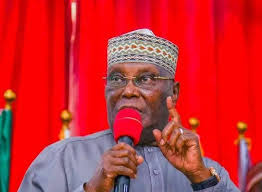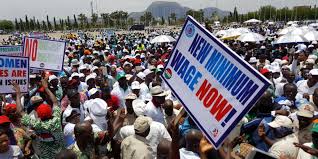News
CRITICAL INFRASTRUCTURE DELIVERY REMAINS OUR FOCUS – FUBARA

•Rates Bori Zonal Hospital Upgrade High
Rivers State Governor, Sir Siminalayi Fubara, has assured that his administration will not waver in its commitment to providing critical infrastructure required for the speedy development of the State.
Governor Fubara gave the assurance while speaking to newsmen shortly after he inspected the extent of reconstruction work done at the Zonal Hospital project at Bori Town, headquarters of Khana Local Government Area on Friday.
The Governor was accompanied on the inspection tour by the State Commissioner for Health, Dr Adaeze Oreh, the State Commissioner for Agriculture, Hon Victor Kii, while the Chairman, Caretaker Committee of the Council, Amb Marvin Yobana was on ground to receive the Governor and his team.
Governor Fubara addressed the concerns expressed by well-meaning Rivers people over recent pronouncements of the court, and said there is no cause to worry because God has prepared him a table of blessings in the presence of his enemies.
He said: “I know that a lot of you will be wondering what is going on and all that. Government has its own challenges. If you go to the book of Psalm 23 verse 5, in the Bible, it said that God prepares a table before you; it can be before anybody. But there is an underlined word that should be noted there: it said ‘in the presence of your enemies’. So, it means that nothing comes easy.
“I want to assure everyone of you and the good people of Rivers State, that we are not deterred. We have made our promises, we will continue to give you good governance, no matter how difficult it is.
“But, like I said before, the worse is over. We are moving on to ensure that we continue to provide what is needed for the development of our State.”
Commenting on the project, Governor Fubara pointed to sectors like healthcare, education, and agriculture as top priority areas that his administration will not compromise attention, and will do everything possible to ensure optimal services can be accessed by the people.
He explained: “We are here today. I believe that from next week, we should be visiting Degema, Ahoada, Omoku, and also ensure that we visit the site of the Modern General and Psychiatric Hospitals in Rumuigbo to see the extent of work that is going on.
“But for now, we are satisfied with what we are seeing here. When we say: zonal hospital, this project is not just for the people of Khana. It is not just for the people of Gokana, even my own constituency, Opobo/Nkoro will also benefit from this facility.
“So, we are assuring the good people of this senatorial district that we will make sure that we put it into completion and good use,” he added.
Governor Fubara explained that his administration did not meet any functional Zonal Hospital, stressing that because it wanted quality healthcare facilities for the people, funds were released about a month ago for the reconstruction and expansion of four zonal hospitals.
The Governor expressed satisfaction that the contractors appeared really committed and had shown that they understand the dream and aspirations of his administration, and were aligning to help it fulfill promises to the people.
He emphasised: “You could remember that I did promise our people that one of the most important areas our budget for the year 2024 will focus on is healthcare, education and agriculture.
“As part of what we did promise our people in the year 2024, that all the Zonal Hospitals, we will do our best to ensure that they come up and are put to use, we are here to inspect the extent of work that is ongoing.
“When we met them (hospitals), their conditions were really bad. There was no accommodation for the medical officers, the doctors, the nurses, and we also added a mortuary to have a full package of what a hospital should be.”
The Governor assured that when completed and put to use, the facilities will meet the healthcare needs of the people within the catchment areas, and address key issues in line with the Sustainable Development Goals (SDGs) and policy objectives of his administration.
News
Police Rescue Kidnapped Victim, Recover Stolen Vehicle

Operatives of the Edo State Police Command have rescued one Osazee Okugbowa from suspected kidnappers.
Moses Yamu, the command’s spokesperson, disclosed this in a statement yesterday, stating that the victim was rescued by operatives of Ologbo Division, Ikpoba-Okha Local Government Area, on Friday, 8th February 2025, at about 5 pm.
Yamu said the victim was kidnapped on 7th February, 2025 by five armed men from his residence in the presence of his family in the Power Line area of Owanoba community.
He stated that the victim had since been reunited with his family after receiving medical attention.
He, however, added that the command is on the trail of the suspects in a bid to arrest them.
Meanwhile, Yamu disclosed that the command has recovered a silver-coloured Toyota Yaris with registration number 535 DR, which was snatched from its owner at gunpoint at Upper Mission Road Extension in Benin City.
He said the car was recovered by operatives of the Okuaihe Division in Uhunmwonde Local Government Area, following a distress call received on 6th February 2025.
He added that the operatives intercepted and pursued the car snatchers, who abandoned the vehicle at Iguomon Community along the Benin-Agbor Road.
Yamu said the car has been handed over to its owner while efforts are ongoing to identify and arrest the suspects.
News
Soludo Rebagged FG Rice Shared To APGA Members-APC

The All Progressives Congress, APC, in Anambra State has protested the dominance of the Chukwuma Soludo-led All Progressives Grand Alliance, APGA, in the affairs of the President Bola Tinubu-led Federal Government.
The party chairman in the state, Mr Basil Ejidike while speaking at the weekend said the dominance of Soludo in affairs that concern Anambra even at the federal level has become a challenge to the state chapter of the APC.
He said all appointments coming to Anambra from the Federal Government had nominees from APGA, while even rice distributed to all states to cushion the effect of hardship had Anambra’s share rebagged with the picture of the governor and distributed to only APGA members last Christmas.
Appealing to Tinubu, Ejidike said, “Sir, may I seize this opportunity to draw your attention to some challenges confronting the APC in Anambra State, that require your kind intervention.
“The issue of appointments made by the Federal government without recourse to the party is inimical to the growth and success of the party in our state, as these appointees do not reckon with the party at the state level.
“Whereby, most of those who have made and are still making heavy sacrifices for the party have not been adequately rewarded and appreciated, many of those who have gotten juicy Federal Government appointments in the past were mainly non-party members, drawn especially from our rival All Progressives Grand Alliance (APGA).”
He said the trend has not served as a source of inspiration or motivation to party members, and is threatening its strength and enthusiasm of emerging victorious in the Anambra 2025 project.
“At the ward, local government and state levels, our members are being discriminated against, as APGA does not recognize or reckon with those who are not their members in the distribution and allocation of government appointments and incentives.
“More worrisome is the fact that what we as a state get from the federal government as incentives and palliatives are usually sent through the state government.
“Sequel to the above, non-APGA members are denied access to them. It is on record that bags of rice sent as palliatives by the federal government were repackaged, and Governor Soludo’s pictures and APGA logo embossed on those bags, thereby giving the impression that they were provided by the governor.
“This arrangement has continued to diminish our party’s influence and reach within the state, and we are terrified to say the least.
“APC in Anambra have come with a passionate appeal, asking that you (Ganduje) intervene and save our members in Anambra from neglect.
“Your kind intervention, Sir, will bolster the morale of our committed party men and women towards the task ahead,” he added.
News
2025 Budgets: I Hope Snake, Monkey Won’t Swallow This One-Atiku

Former Vice President of Nigeria, Atiku Abubakar, has cautioned against the misappropriation of funds allocated to the health sector in the 2025 budget, referencing past bizarre claims of animals—such as snakes, termites, gorillas, and monkeys—being blamed for missing public funds. He stressed that such absurd incidents must not be allowed to happen with resources meant for healthcare.
Amid dwindling resources and reduced external support for healthcare services, Abubakar emphasised the need for transparency and accountability in the government’s $1.07 billion budgetary appropriation for the health sector. He called for mechanisms to ensure public audits and proper utilization of every kobo earmarked for healthcare.
The former vice president specifically questioned the government’s failure to provide a detailed breakdown of how it intends to spend over a billion dollars in the primary health sector. He noted that while investment in primary healthcare is crucial for providing Nigerians with accessible and affordable medical services, it would be unethical for the government to allocate such a significant sum without disclosing its intended use.
“The Federal Government has announced plans to spend a whopping $1.07 billion in the primary health sector, in addition to the N2.48 trillion initially proposed for healthcare in the budget,” Abubakar noted.
“What is even more concerning is that this additional funding is largely sourced from foreign loans, with a small portion coming from an international donor agency. Since these loans must be repaid, Nigerians have the right to know the full details and ensure that the expenditure is transparent and well-justified,” he added.
Abubakar further criticized the government for failing to commit to any physical infrastructure projects within the health sector, suggesting that this raises red flags about potential mismanagement or fraud.
According to the government, the funds will be used to improve governance in healthcare and strengthen primary health services nationwide, including recruitment, training, and retention of healthcare workers and teachers. However, Abubakar argued that the government has a poor track record in managing public funds, particularly in humanitarian services, and that Nigerians should not accept vague explanations without clear accountability mechanisms.
“It is difficult to trust this administration’s claims, especially given its history of misleading Nigerians about investments in social infrastructure,” he said.
He pointed out the government’s misleading statements about improvements in tertiary hospitals, despite the reality that many of these institutions lack basic amenities, such as stable electricity supply.
“The Tinubu administration has failed in the health sector due to poor funding. Major diseases in primary healthcare, including malaria, tuberculosis, and HIV/AIDS, remain critical challenges. If this government is truly committed to healthcare, it must clarify how it plans to use this intervention fund to tackle these diseases,” Abubakar stated.
He also criticized the government’s response to the recent withdrawal of American aid for HIV/AIDS treatment, noting that its proposed intervention of N5 billion is grossly inadequate.
“If the Tinubu administration does not present a clear framework for managing this significant health sector investment or subject it to proper legislative scrutiny, then it may be safe to conclude that this is yet another case of public funds being mismanaged under the guise of serving Nigerians,” Abubakar concluded.
-

 Politics3 days ago
Politics3 days agoProposed States Creation: Youth Leader Lauds Nass Over Obolo State Inclusion
-

 News3 days ago
News3 days agoTreasury Bills Attract N3.22trn From Investors
-

 Sports3 days ago
Sports3 days agoNPFL: Remo Narrowly Beat Pillars 2-1 To Maintain Lead
-

 News3 days ago
News3 days agoAfDB Dissatisfied With $210m Nigeria Agro-Industrial Zones Project
-

 Niger Delta3 days ago
Niger Delta3 days agoDiri Unhappy Over Poor State Of Public Schools
-

 Editorial3 days ago
Editorial3 days agoNew Federal Varsity In Ogoni
-

 News3 days ago
News3 days agoN70,000 Minimum Wage States’ Salaries Rise By 90% To N3.8trn
-

 Oil & Energy3 days ago
Oil & Energy3 days agoWAPCo Commences Four-Week Pipeline Maintenance

